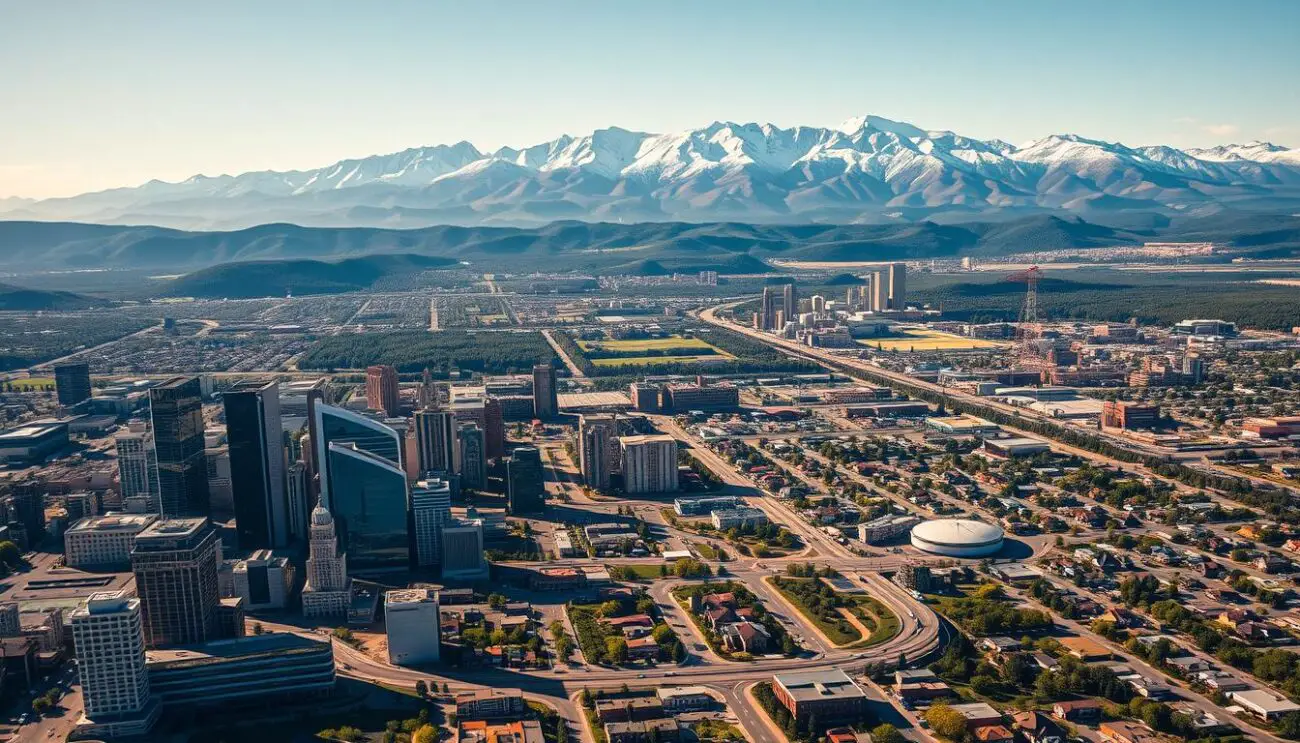Colorado’s population growth is slowing down. By 2025, the state’s population is expected to increase by 51,400 people. This is the largest growth since 2019. This trend could affect the state’s economy and job market.
The forecast shows a decrease in population growth rate. It has dropped from 98,900 in 2015 to the current estimate. This change is important to consider.
Several factors influence Colorado’s population trends. Job growth and labor force participation are key. The state is expected to see a 1.2% job growth in 2025, adding about 36,700 new jobs. Colorado also has a high labor force participation rate, ranking fourth in the U.S.
The slowing population growth and its impact on the economy are crucial. Policymakers and business leaders need to understand these trends. This knowledge helps them make informed decisions for the future.
Key Takeaways
- Colorado’s population growth is slowing down, with a projected increase of 51,400 people in 2025.
- The state’s population growth rate has decreased significantly, dropping from 98,900 in 2015 to the current estimate.
- The colorado population 2025 forecast suggests a high labor force participation rate, with the state boasting the fourth highest rate in the U.S.
- Job growth in Colorado is expected to continue, with a projected increase of 1.2% in 2025.
- The state’s economy is expected to be influenced by the slowing population growth and job growth trends.
- The colorado forecast indicates a high demand for skilled workers, with an average of 40,000 workers expected to retire annually over the next decade.
Current Demographic Landscape of Colorado
Colorado’s population growth is slowing down. It’s expected to grow by 1.2% in 2025, as shown by USAFacts. The state’s aging population and fewer births are reasons for this slowdown. The population is set to increase by 51,000 in 2025, after a 43,000 increase in 2024.
The growth rate in Colorado is expected to be about twice the national average. Despite challenges, the state’s population is still growing. In October 2024, 62.6% of the labor force was active, down from 63.3% in January 2020. The education and health services sector is expected to grow by 2.3% in 2025, while government jobs are projected to increase by 1.3%.
The trade, transportation, and utilities sector, the largest job provider in Colorado, is expected to add 1,500 jobs with a growth rate of 0.3%. The natural resources and mining sector is expected to grow by 4.4% in 2025, adding around 1,000 jobs. These projections show a shift in the state’s demographics and growth patterns, focusing on specific industries and sectors.
According to projections, the population of certain counties in Colorado is expected to continue growing. El Paso County’s population is expected to be 744,215, Denver County’s 716,577, and Arapahoe County’s 656,061. These statistics provide insight into the state’s demographics and growth patterns, highlighting the need for informed decision-making and planning.
Colorado Population 2025: Comprehensive Forecast Analysis
The University of Colorado’s report says Colorado’s population will keep growing, but at a slower pace. This growth will mainly happen in urban areas. Richard Wobbekind, CU Leeds senior economist, notes, “slower growth … may be the new reality for Colorado as population growth, through net migration, remains slow.”
This slow growth affects the labor force and job creation. It’s a challenge for the state’s economy.
A detailed look at the data shows Colorado’s population will hit new highs by 2025. The state’s growth is driven by migration patterns, age demographics, and economic conditions. By studying these, we can understand the trends shaping Colorado’s population.

The forecast analysis deeply examines the data, considering many factors that impact population growth. This helps us grasp the trends shaping Colorado’s population by 2025. It offers insights for policymakers, businesses, and individuals wanting to know about the state’s demographic future.
Conclusion: Preparing for Colorado’s Demographic Evolution
As Colorado’s population
continue to shift, the state must proactively address the challenges and opportunities presented by these
and
. The need for workforce development and economic growth strategies is increasingly pressing. This is because the state is facing a gradual decline in population growth and a graying of its resident base.
According to Phyllis Resnick, lead economist and executive director for the Colorado Futures Center at Colorado State University, “we’ve traded political uncertainty for policy uncertainty.” This uncertainty highlights the importance of data-driven
and adaptable policies. These are crucial to ensure Colorado remains an attractive destination for businesses and families alike. By anticipating and planning for the state’s demographic evolution, policymakers and business leaders can position Colorado for sustained prosperity in the years to come.
FAQ
What is the current demographic landscape of Colorado?
Colorado’s population is a mix of city and rural areas. The age groups are changing, and the economy is a big factor. People moving in and out also play a role. The state’s economy is strong, even with global challenges.
What are the key factors influencing Colorado’s population growth?
Economic trends, demographic shifts, and migration patterns are key. Growth is slow, affecting jobs and the workforce. This creates challenges for the state’s economy.
What is the forecast for Colorado’s population by 2025?
By 2025, Colorado’s growth might slow down. This brings both challenges and chances. The state needs to focus on jobs and economic growth to adapt.
How can Colorado prepare for its demographic changes?
Colorado must act now to face its changing population. It needs plans for jobs, economic growth, and policy changes. This will help the state thrive in the future.
Source Links
- https://coloradosun.com/2024/12/10/colorado-economic-forecast-2025/
- https://bizwest.com/2024/12/10/slower-growth-could-be-new-reality-for-colorado/
- https://www.colorado-demographics.com/counties_by_population
- https://www.colorado.edu/today/2024/12/09/colorados-economic-forecast-2025-slower-growth-amid-uncertainty
- https://www.forbes.com/sites/energyinnovation/2024/10/29/colorado-cant-afford-project-2025s-economic-and-climate-damage/
- https://coloradorpmcoloradosprings.com/forecast-for-the-housing-market-in-2024-and-2025/
- https://www.steadily.com/blog/colorado-real-estate-market-overview
- https://www.westword.com/news/colorado-demographer-population-growth-years-behind-forecast-22578072
- https://www.denverpost.com/2024/12/09/colorado-economy-slowing-jobs-migration/
- https://coloradosun.com/2024/08/06/births-falling-denver-schools/
I am Lazar Bojic, an established professional in digital marketing with almost a decade of experience. Specializing in an array of niches has been my main strength as a content creator. Besides being a content writer, I have participated in creating various other content types, including infographics and script writing for video content creators, across numerous niches. Among my standout works, content creation at wikibiography.in certainly holds a special place.

